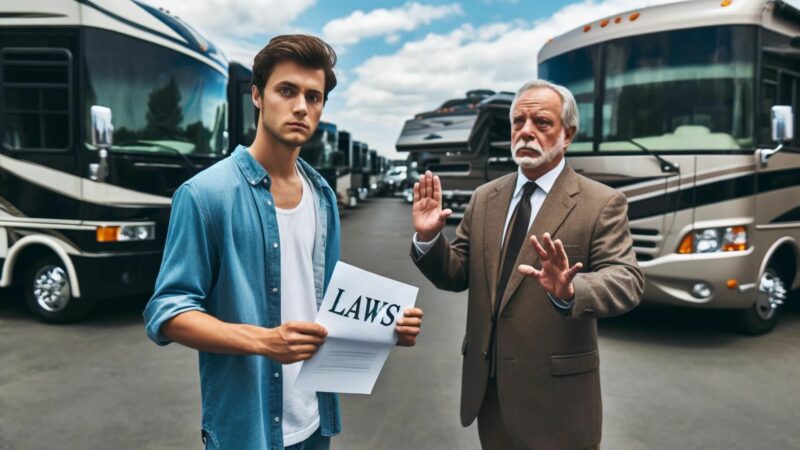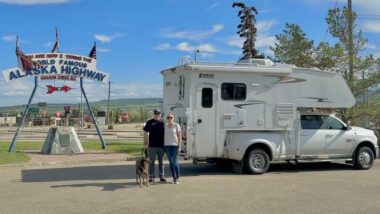Table of Contents Show
While the process of buying an automobile and an RV are relatively similar, the laws governing them are not. Unfortunately, many consumers don’t discover this until it’s too late.
Sadly, many rules and regulations that protect consumers when buying automobiles don’t apply to RVs. If you plan to buy a new or used RV anytime soon, you need to know this.
Today, we’ll examine why these laws differ and how to protect yourself. Navigating the complexity of car buying when it comes to RVs can be highly challenging.
So, let’s get started!
What Are Car Buying Laws?
Car buying laws are the regulations that private sellers and dealerships must follow when selling an automobile.
Generally, these vary considerably based on location, so you’ll need to verify those specifics to where you live.
Some of the common laws require the disclosure of particular information.
This often includes the vehicle’s condition, history, and known defects.
It’s also common for these regulations to ensure the consumer receives fair and transparent pricing during the process.
These critical rules and regulations protect the buyer and seller in the transaction.
They help ensure that both parties meet the requirements for a legally binding transaction.
The seller can be confident they have the information and safeguards to complete the transaction.
What Are RV Lemon Laws?
RV lemon laws are the rules and regulations to protect consumers purchasing recreational vehicles.
Not only are they complex and confusing, but they also vary by state.
As a result, this is another area where you’ll need to check the laws specific to your location.
In general, they’re in place to protect consumers in situations where their RV has severe defects and mechanical issues.
Officials typically only consider an RV a lemon if the issue causes safety issues, impacts the value, or is inoperable.
However, even in states that do have lemon laws, there are typically several requirements that consumers must meet.
For example, the protections are only valid for a certain period of time, and individuals must notify the seller of the issues.
In addition, they must give them the time and opportunities to rectify the situation.
If you’ve jumped through these hoops and aren’t getting anywhere, you may need to consult legal advice from a professional.
Reasons Car Buying Laws Don’t Apply to RVs
Despite what many consumers believe, there are several reasons why car-buying laws don’t apply when buying an RV.
Let’s take a look and try to make sense of the chaos designed to protect you as a consumer.
Classification of Vehicle
One of the primary reasons RVs are exempt from car buying laws is due to their classification.
Some states classify them as personal property and not motor vehicles. This distinct difference allows recreational vehicles to be exempt from important consumer protection laws.
Generally, motorized RVs are likelier to follow car buying laws more closely. This is because many of the components of these vehicles are very similar to those of automobiles.
On the other hand, towable trailers are less likely to have to follow these requirements.
Dual Purpose
Similar to their classification, their dual-purpose nature also creates a gray area for them. They’re both a form of transportation and a living space.
In addition, some consumers buy recreational vehicles and park them in a permanent spot for housing.
Being both an automobile and portable residence puts them in a class of their own when.
Sizes and Types
As mentioned earlier, many drivable RVs fall under the car buying laws.
This is especially true for Class B vans and other similar vehicles. This is because they’re often a standard vehicle structure that gets modified.
However, larger motorhomes and trailers usually distance themselves from standard passenger vehicles and get exempted from these laws.
Extended Features
Another reason that car buying laws don’t apply to RVs is that they’re full of numerous extended features.
Many recreational vehicles come loaded with items you’re likely not going to find when buying a standard car. Things like kitchens, bathrooms, and multiple televisions.
These extended features separate RVs from regular automobiles even further.
Consumer Expectations
The final reason that car buying laws don’t apply to RVs is that consumer expectations are substantially different.
As their name indicates, RVs are typically for recreational purposes.
As a result, this distinction creates even further distance from why campers do not fall under normal car-buying laws.
Should Car Buying Laws Apply to RVs?
While RVs don’t fall under most traditional car buying laws, some consumer protections are still in place.
For example, the Magnuson-Moss Warranty Act ensures all RV warranties must be spelled out for the consumer. It helps to ensure that consumers aren’t left high and dry when appliances and other essential systems don’t work.
When buying an RV, you must fully understand what you’re getting into. The laws that protect consumers can be very confusing.
Being aware of them can help protect you from regretting your purchase. Having buyer’s remorse will make it extremely challenging for you to relax and enjoy your camper.






